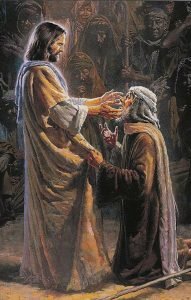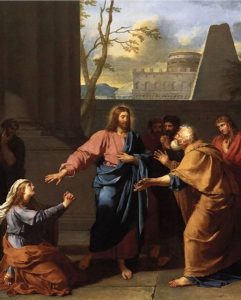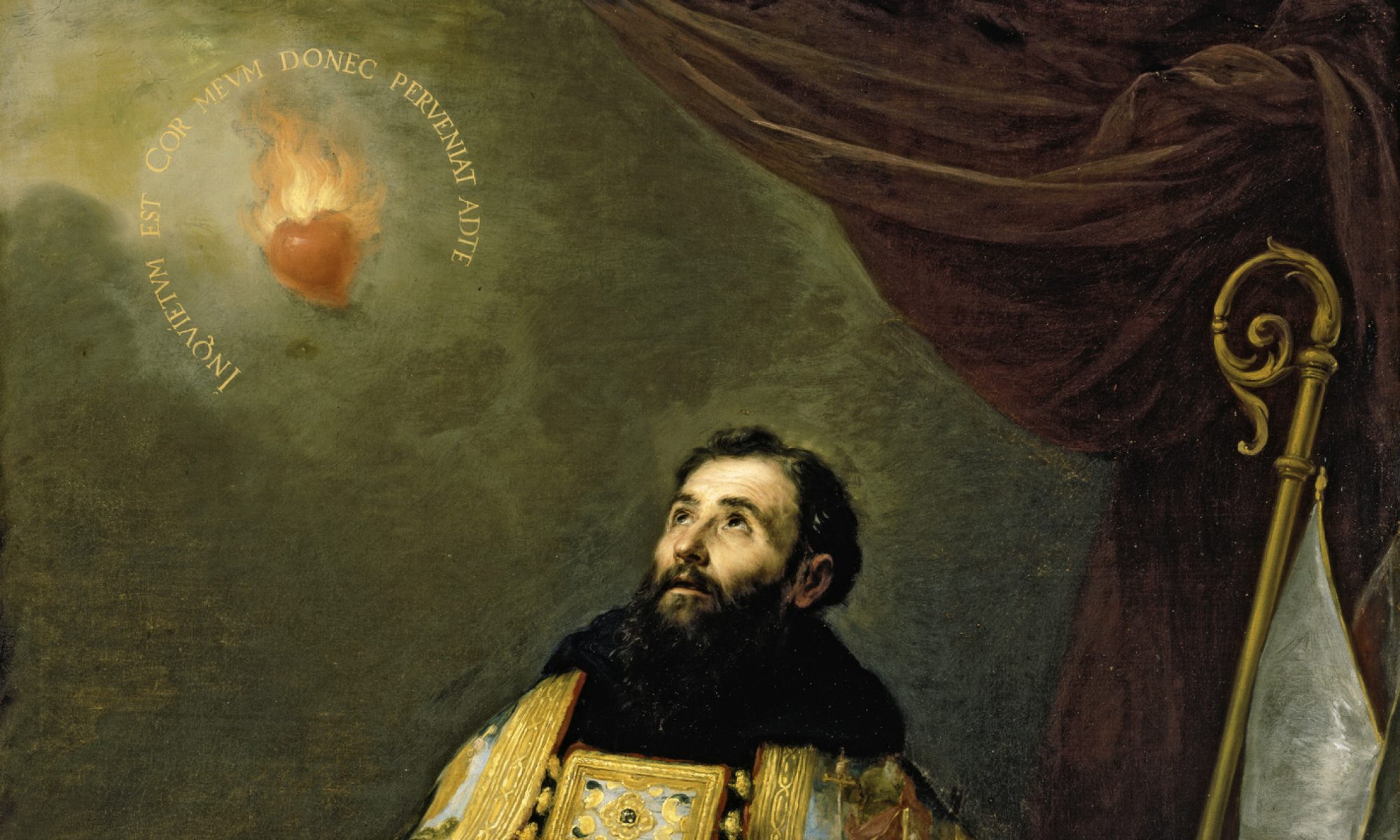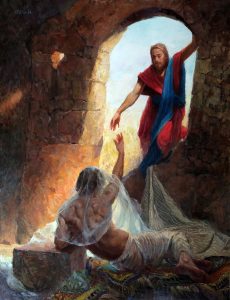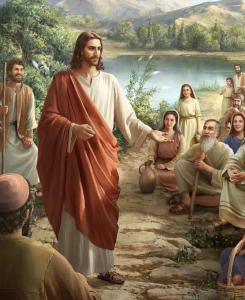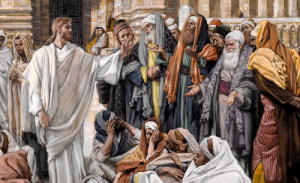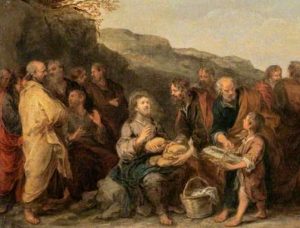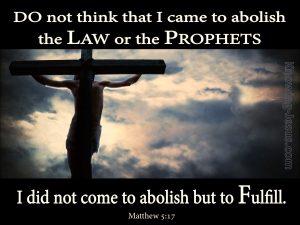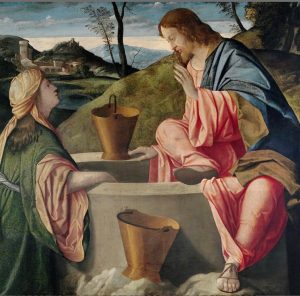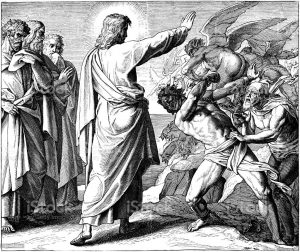Today is the 4th Sunday of Lent, commonly called Laetare Sunday. Traditionally, this Sunday has been a day of celebration within the austere period of Lent. This Sunday gets its name from the first few words in the Latin Mass Antiphon or Introit. “Laetare Jerusalem” (“Rejoice, O Jerusalem, and come together all you that love her, rejoice with joy, you that have been in sorrow: that you may exult, and be filled from the breasts of your consolation.”) taken from Isaiah 66:10. In Latin, (Laetare, Jerusalem: et conventum facite, omnes qui diligitis eam; Gaudete cum Laetitia, qui in tristitia fuistis: ut exsultetis, et satiemini ab uberibus consolationis vestrae.)
This fourth Sunday, we have public scrutiny after the homily for those who will join us through baptism or confirmation at Easter. This scrutiny rite is part of the process of joining the Church to test and to proclaim their desire in public to know more about Jesus, around which our community is formed and being informed. This week we hear the story of Jesus, who is the light of the world, the one who brings light by restoring the sight of the man born blind. Since last Sunday, we have done this scrutiny in order for us to understand about Jesus. He was telling the Samaritan woman, “Whoever drinks the water I shall give will never thirst; the water I shall give will become in him a spring of water welling up to eternal life.” In today’s gospel Jesus is giving the light to the blind man; then next Sunday, the gospel is about Jesus’ power by raising Lazarus from the dead. Believing in the gospel stories, we come to understand Jesus’ identity and we come to know Him better.
Our sight is very important. Without it we walk in darkness and we have very limited mobility and the capacity to do things compared to those who have good eyesight. For the past three years, I have been battling losing my sight. I’ve had 22 eye-injections, eye-lasers, and constant visits to eye specialists. I am worried about not being able to do my pastoral responsibilities, and I have prayed for healing. My friends and parishioners assured me of their prayers too. Thanks to all of them for their intercessory prayers for me. When I have seen my doctor, he is surprised of the improvement of my vision. He could hardly believe that I could read even the smallest font. He said that out of thousand patients, I was the only one with such rapid recovery. He said, it was a miracle. I really do believe in the power of prayers and am hoping that both of my eyes are permanently healed with God’s grace.
Maybe many of us have had experiences of being put on trial. We hardly receive healing because doubts overwhelm us rather than putting our trust in the power of the Lord to heal us.
This gospel pericope from John demands our serious reflection on how Jesus healed the man born blind even though he did not ask Jesus to be healed. It was his lucky day that Jesus offered him to receive the gift of healing and the man agreed. All he did was to say, “yes.” Jesus graciously helps him see with the grace of the Lord.
There are wonderful reflection points that I want to share so that we come to a deeper understanding of the gospel.
First, the man born blind goes home, then meets his neighbors and friends which prompted him to share the story of why his vision was restored. He tells these people who have known him all his life about his encounter with a man who smeared clay on his eyes and told him to “go and wash in the Pool of Siloam.” He then “came back able to see.” The man was healed.
Second, his neighbors have seen him be able to see and his eyes widely open with clear vision. They want authorities to tell them rather than believing him. The testimony he made was, “I met a man and he healed me.” After his healing, he did not hesitate to speak about what had happened to him. That is the right thing to do that in every blessing we receive, we ought to proclaim the goodness of God.
Third, when the man born blind received healing, he was changed as a person. When God manifests His great power of healing, especially when we go to confession, our whole being changes. We become a new person, and our place in the world is different knowing God who has rescued us.
Fourth, Jesus healed the man on the Sabbath. The Pharisees said that the man who healed the blind “is not from God because he does not keep the Sabbath.” In this story, Jesus didn’t come to his own defense or to prove the Pharisees were wrong, but rather to help them and us to be right with God. Being legalistic in our approach is not good, At all times, doing good things towards others must be our primary duty. Our decision and actions require a new way of seeing. We don’t like the Pharisees who went to the blind man, in order not to see the obvious. This is our tendency, that in various ways, we refuse to see.
I humbly exhort everyone that in this season of Lent, we take time to examine our experiences that prevent us from seeing. The first reading warns us to accept his words, “Not as man sees God does see, because man sees the appearance but God looks into the heart.” We are being gently reminded to see people for who they are, not what they look like.
During this Lent, let us, “Try to learn what is pleasing to the Lord,” according to what St. Paul in today’s second reading exhorts us to do.
St. Augustine says, “You ought not to see in order to believe, you ought to believe in order to see.” (Sermo, xxxviii, 2, P.L., V, 236). And it is in this sense that we must understand the journey of the man born blind.
God bless you.
Fr. Arlon, osa
—————————
El Dictado del Corazón: Cuarto Domingo de Cuaresma, Año A
- 1 Samuel 16:1b, 6-7, 10-13a
- Salmos 23: 1-3a, 3b-4, 5, 6
- Efesios 5:8-14
- Juan 9:1-41
Hoy es el Cuarto Domingo de Cuaresma, comúnmente llamado: Domingo Laetare. Tradicionalmente, este domingo ha sido un día de celebración, dentro del austero período de Cuaresma. Este Domingo recibe su nombre de las primeras palabras de la Antífona o Introito de la Misa en latín. “Laetare Jerusalem” (Alégrate, oh Jerusalén, y únete a todos los que la aman, regocíjate con alegría, tú que has estado en dolor: para que puedas regocijarte y ser lleno de los pechos de tu consolación) tomado de Isaías 66: 10 En latín, (Laetare, Jerusalén: et convent facite, omnes qui diligitis eam; Gaudete cum Laetitia, qui in tristitia fuistis: ut exsultetis, et satiemini ab uberibus consolationis vestrae.
Este cuarto Domingo tenemos escrutinio público después de la homilía para aquellos que se unirán a nosotros a través del bautismo o la confirmación en Pascua. Este rito de escrutinio es parte del proceso de unión de la Iglesia para probar y proclamar públicamente su deseo de conocer más a Jesús en torno al cual se forma y se informa nuestra comunidad. Esta semana escuchamos la historia de Jesús que es la luz del mundo, el que trae la luz devolviendo la vista al ciego de nacimiento. Desde el domingo pasado, hemos hecho este escrutinio para entender a Jesús. Le estaba diciendo a la mujer samaritana: “El que beba del agua que yo le daré, no tendrá sed jamás: el agua que yo le daré se convertirá en él en una fuente de agua que salte para vida eterna”. El evangelio de hoy, Jesús está dando la luz al hombre ciego, luego el próximo domingo, el evangelio trata sobre el poder de Jesús al resucitar a Lázaro de entre los muertos. Al creer en las historias del evangelio, llegamos a comprender la identidad de Jesús y llegamos a conocerlo mejor.
Nuestro sitio es muy importante. Sin ella, caminamos en la oscuridad y tenemos una movilidad y una capacidad de hacer cosas muy limitadas en comparación con los que tienen buena vista. Durante los últimos tres años, luché contra perder la vista. Tuve 22 inyecciones en los ojos, láseres en los ojos y visitas constantes a especialistas en ojos. Me preocupa no poder cumplir con mis responsabilidades pastorales y he orado por sanación. Mis amigos y feligreses también me aseguraron sus oraciones. Gracias a todos ellos por sus oraciones de intercesión por mí. Cuando he visto a mi médico, se sorprendió de la mejora en mi visión. Apenas podía creer que podía leer incluso la fuente más pequeña. Dijo que de mil pacientes, yo era el único con una recuperación tan rápida. Dijo que era un milagro. Realmente creo en el poder de las oraciones y espero que mis dos ojos sean sanados permanentemente con la gracia de Dios.
Quizás muchos de nosotros tuvimos experiencias de ser juzgados. Difícilmente recibimos sanidad porque las dudas nos abrumaron en lugar de poner nuestra confianza en el poder del Señor para sanarnos.
Esta perícopa del evangelio de Juan exige nuestra seria reflexión sobre cómo Jesús sanó al ciego de nacimiento aunque no le pidió a Jesús que lo sanara. Era su día de suerte que Jesús le ofreció recibir el don de la sanidad y el hombre accedió. Todo lo que hizo fue decir “sí”. Jesús amablemente le ayuda a ver con la gracia del Señor.
Hay maravillosos puntos de reflexión que quiero compartir para que lleguemos a una comprensión más profunda del evangelio.
Primero, el hombre ciego de nacimiento va a casa, luego se encuentra con sus vecinos y amigos, lo que lo llevó a compartir la historia de por qué se restauró su visión. Le dice a estas personas que lo han conocido toda su vida. Les contó sobre su encuentro con un hombre que se untó la arcilla en los ojos y le dijo: “ve y lávate en la piscina de Siloé”, luego “regresó y pudo ver”. El hombre fue sanado.
En segundo lugar, sus vecinos lo han visto capaz de ver y sus ojos bien abiertos con una visión clara, quieren que las autoridades les digan en lugar de creerle. Su testimonio que hizo fue “Conocí a un hombre y me sanó”. Después de su curación, no dudó en hablar de lo que le había sucedido. Eso es lo correcto en cada bendición que recibimos, debemos proclamar la bondad de Dios.
Tercero, cuando el ciego de nacimiento recibió sanidad, cambió como persona. Cuando Dios manifiesta su gran poder de sanación, especialmente cuando nos confesamos, todo nuestro ser cambia. Nos convertimos en un pueblo nuevo y nuestro lugar en el mundo es diferente conociendo a Dios que nos ha rescatado.
Cuarto, Jesús sanó a un hombre en sábado. Los fariseos decían que el hombre que sanaba a los ciegos “no es de Dios porque no guarda el sábado. En esta historia, Jesús no vino en su propia defensa o para probar que los fariseos estaban equivocados, sino para ayudarlos a ellos y a nosotros a estar bien con Dios. Ser legalista en nuestro enfoque no es bueno, en todo momento, hacer cosas buenas hacia los demás debe ser nuestro deber principal. Nuestras decisiones y acciones requieren una nueva forma de ver. No nos gustan los fariseos que fueron al ciego para no ver lo obvio. Esta es nuestra tendencia que, de varias maneras, nos negamos a ver.
Humildemente exhorto a todos a que du En este tiempo de Cuaresma, nos tomamos un tiempo para examinar las experiencias que nos impiden ver. La primera lectura nos advierte que aceptemos sus palabras: “No como el hombre ve, Dios ve porque el hombre ve la apariencia, sino que Dios mira en el corazón”. Se nos recuerda gentilmente que veamos a las personas por lo que son, no por su apariencia.
San Agustín dice: “No debes ver para creer, debes creer para ver”. (Sermo, xxxviii, 2, P.L., V, 236). Y es en este sentido que debemos entender el camino del ciego de nacimiento.
Durante esta Cuaresma, “tratemos de aprender lo que es agradable al Señor”, según nos exhorta san Pablo en la segunda lectura de hoy.
Dios lo bendiga.
Padre Arlón, osa
